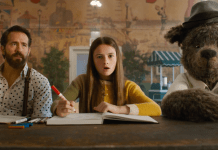

The story of a workaholic father in Hawaii who is forced to take the emotional reins following a tragic incident in his family, the material was powerful enough to coax Sideways auteur Alexander Payne back into the director’s chair after a prolonged absence, and has resulted in George Clooney giving a career-best performance.
We recently had the opportunity to speak to the writer about her thoughts on the film and the adaptation process.
Kaui, how soon after the book’s release was it optioned for the screen?
It was actually picked up a few weeks before it went onto shelves.
Wow. That’s pretty great. How soon afterwards did Alexander Payne came into the picture?
I guess a year or so after the option. There was always the plan for him to produce it, but another director involved dropped out and Alexander finally came around and said he would make it his next film as a director. He emailed me when just after he made his decision and came out to Hawaii. We met and it happened pretty quickly after that.
Did you have any say in the script process at all?
I really didn’t want to be involved in the script, but I offered my services if they needed me, and it turns out they did. Alexander moved to Hawaii for about eight months before shooting and I showed him around many of the location featured in the book and introduced him to people of were sort of equivalent to some of the characters I’d written. I looked at the drafts (of the script) and gave notes so I was pretty involved in the end.
The film remains pretty faithful to the novel, but there’s some minor changes. The characters of Alexandra and Sid (the teenage daughter of Clooney’s character and her best friend) seem a little more innocent in the film. Do you mind changes being made to your work?
I don’t mind at all. My book is there forever and it’s never gonna change in that respect. Any transformations made for the screen are important for a good film because Alexander had to make it his way and a literal translation of the book would be very stale. I think the book and film work well together because of the slight shift between them. They’re slight changes and yet, they’re still very much the same world in terms of tone and story.
What made you want to tackle the story from a male perspective?
I guess that’s how I am. I didn’t really consider setting it from a woman’s point of view. I enjoy writing from a male viewpoint and I like the fact that I can stray outside of my self more than I could with someone of my own sex. I’ve never wanted to write about myself as a first-time novelist, and I especially didn’t want to write a personal piece.
How much as a challenge did this represent for you?
It very hard work, but I think it would have been just as challenging from a female outlook. It’s about inhabiting someone else’s head.
It’s clear you have a real affinity for Hawaii. I suppose that was a conscious thing to really integrate the location into the story?
I wanted to bring the place and setting to life. I think it’s important in fiction that every character is from somewhere and that their actions are often bound to the place they come from.
Is the finished film close to the version you envisioned?
I think it’s a wonderful adaptation and interpretation of the book. I thrilled by what’s been done. I think there’s a limit to what novels can do. You don’t have the beautiful scenery which looms over the characters in a sometimes ominous, thoughtful and even mundane way. I don’t necessarily think I couldn’t have imaged it the way it’s turned out, but I’m so pleased with the results. In an unusual way, it’s the greatest gift you can receive when you write a book and watch a great director come along and make it.
The film was adapted from your feature-length novel. What’s next for you?
I just finished another book and also a script, so I’m waiting for feedback on both.
What’s your script about?
It’s set in a ski resort town in Colorado and it’s kind of a comedy, but there’s nothing to report on as yet (laughs).
Did the scriptwriting come about after seeing your book turned into a film or have you been toying with doing it for a while?
Some people suggested to me to write one and I thought it may be fun to give it a shot, and it turns out I really, really enjoy it. We’ll see how this project goes but I’d like to try writing another one. I really like the form and the also quickness of it too. A novel can take years and years and a script is much shorter, and I feel like you can get to know the character by what they say and how they say it and that’s the real draw for me. You’re communicating on one level but saying something else at the same time. I like the way (film) dialogue can really bring out the characters and move the story along.






